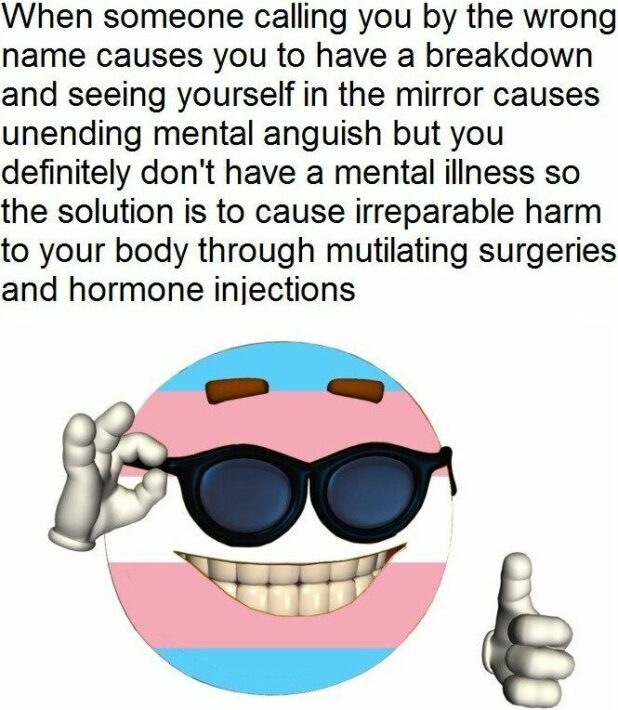Listening to the science means being willing to question your prior assumptions when confronted by new data.
An in-depth investigation into detransition and the state of the research, also featuring @redetranscanada https://t.co/O31YiKywek pic.twitter.com/4k9fyBb3RH
— Kinnon Ross MacKinnon – MSW, PhD (@Kinnon_Ross) December 22, 2022
Reuters has a special report up about the problem of trannies “detransitioning” from being trannies, with experts saying they are trying to figure out how to stop this from happening.
It seems that if you’re going to count up the “detransitioners,” you need to count the trannies who commit suicide.
There are no dead trannies – only men and women with mutilated bodies.
Understanding the reasons some transgender people quit treatment is key to improving it, especially for the rising number of minors seeking to medically transition, experts say. But for many researchers, detransitioning and regret have long been untouchable subjects.
For years, Dr Kinnon MacKinnon, like many people in the transgender community, considered the word “regret” to be taboo.
MacKinnon, a 37-year-old transgender man and assistant professor of social work at York University here, thought it was offensive to talk about people who transitioned, later regretted their decision, and detransitioned. They were too few in number, he figured, and any attention they got reinforced to the public the false impression that transgender people were incapable of making sound decisions about their treatment.
MacKinnon, a 37-year-old “transgender man”
“This doesn’t even really happen,” MacKinnon recalled thinking as he listened to an academic presentation on detransitioners in 2017. “We’re not supposed to be talking about this.”
MacKinnon, whose academic career has focused on sexual and gender minority health, assumed that nearly everyone who detransitioned did so because they lacked family support or couldn’t bear the discrimination and hostility they encountered – nothing to do with their own regret. To learn more about this group for a new study, he started interviewing people.
In the past year, MacKinnon and his team of researchers have talked to 40 detransitioners in the United States, Canada and Europe, many of them having first received gender-affirming medical treatment in their 20s or younger. Their stories have upended his assumptions.
Many have said their gender identity remained fluid well after the start of treatment, and a third of them expressed regret about their decision to transition from the gender they were assigned at birth. Some said they avoided telling their doctors about detransitioning out of embarrassment or shame. Others said their doctors were ill-equipped to help them with the process. Most often, they talked about how transitioning did not address their mental health problems.
In his continuing search for detransitioners, MacKinnon spent hours scrolling through TikTok and sifting through online forums where people shared their experiences and found comfort from each other. These forays opened his eyes to the online abuse detransitioners receive – not just the usual anti-transgender attacks, but members of the transgender community telling them to “shut up” and even sending death threats.
“I can’t think of any other examples where you’re not allowed to speak about your own healthcare experiences if you didn’t have a good outcome,” MacKinnon told Reuters.
The stories he heard convinced him that doctors need to provide detransitioners the same supportive care they give to young people to transition, and that they need to inform their patients, especially minors, that detransitioning can occur because gender identity may change. A few months ago, he decided to organize a symposium to share his findings and new perspective with other researchers, clinicians, and patients and their families.
Not everyone was willing to join the discussion. A Canadian health provider said it couldn’t participate, citing recent threats to hospitals offering youth gender care. An LGBTQ advocacy group refused to promote the event. MacKinnon declined to identify either, telling Reuters he didn’t want to single them out. Later, after he shared his findings on Twitter, a transgender person denounced his work as “transphobia.”
He expected his research would be a hard sell even to many of the 100 or so people from Canada, the United States and elsewhere who accepted his invitation. “I need your help,” he told the crowd that assembled in November in a York University conference room for the daylong session. “My perspectives have changed significantly. But I recognize that for many of you, you may find yourselves feeling much like I did back in 2017 – challenged, apprehensive, maybe fearful.”
Fighting words
In the world of gender-affirming care, as well as in the broader transgender community, few words cause more discomfort and outright anger than “detransition” and “regret.” That’s particularly true among medical practitioners in the United States and other countries who provide treatment to rising numbers of minors seeking to transition.
They insist, as MacKinnon once did, that detransitioning is too rare to warrant much attention, citing their own experiences with patients and extant research to support their view. When someone does detransition, they say, it’s almost never because of regret, but rather, a response to the hardship of living in a society where transphobia still runs rampant.
“These patients are not returning in droves” to detransition, said Dr Marci Bowers, a transgender woman, gender surgeon and president of the World Professional Association for Transgender Health (WPATH), an international group that sets guidelines for transgender care. Patients with regret “are very rare,” she told Reuters. “Highest you’ll find is 1% or 1.5% of any kind of regret.”
Doctors and many transgender people say that focusing on isolated cases of detransitioning and regret endangers hard-won gains for broader recognition of transgender identity and a rapid increase in the availability of gender care that has helped thousands of minors. They argue that as youth gender care has become highly politicized in the United States and other countries, opponents of that care are able to weaponize rare cases of detransition in their efforts to limit or end it altogether, even though major medical groups deem it safe and potentially life-saving.
“Stories with people who have a lot of anger and regret” about transitioning are over-represented in the media, and they don’t reflect “what we are seeing in the clinics,” said Dr Jason Rafferty, a pediatrician and child psychiatrist at Hasbro Children’s Hospital in Providence, Rhode Island. He also helped write the American Academy of Pediatrics’ policy statement in support of gender-affirming care. Detransitioning is a “very invalidating term for a lot of people who are trans and gender-diverse,” Rafferty said.
Some people do detransition, however, and some do so because of regret. The incidence of regret could be as low as clinicians like Bowers say, or it could be much higher. But as Reuters found, hard evidence on long-term outcomes for the rising numbers of people who received gender treatment as minors is very weak.
Dr Laura Edwards-Leeper, a clinical psychologist in Oregon who treats transgender youths and a co-author of WPATH’s new Standards of Care for adolescents and children, said MacKinnon’s work represents some of the most extensive research to date on the reasons for detransitioning and the obstacles patients face. She said the vitriol he has encountered illustrates one reason so few clinicians and researchers are willing to broach the subject.
“People are terrified to do this research,” she said.
For this article, Reuters spoke to 17 people who began medical transition as minors and said they now regretted some or all of their transition. Many said they realized only after transitioning that they were homosexual, or they always knew they were lesbian or gay but felt, as adolescents, that it was safer or more desirable to transition to a gender that made them heterosexual. Others said sexual abuse or assault made them want to leave the gender associated with that trauma. Many also said they had autism or mental health issues such as bipolar disorder that complicated their search for identity as teenagers.
Echoing what MacKinnon has found in his work, nearly all of these young people told Reuters that they wished their doctors or therapists had more fully discussed these complicating factors before allowing them to medically transition.
No large-scale studies have tracked people who received gender care as adolescents to determine how many remained satisfied with their treatment as they aged and how many eventually regretted transitioning. The studies that have been done have yielded a wide range of findings, and even the most rigorous of them have severe limitations. Some focus on people who began treatment as adults, not adolescents. Some follow patients for only a short period of time, while others lose track of a significant number of patients.
“There’s a real need for more long-term studies that track patients for five years or longer,” MacKinnon said. “Many detransitioners talk about feeling good during the first few years of their transition. After that, they may experience regret.”
In October, Dutch researchers reported results of what they billed as the largest study to date of continuation of care among transgender youths. In a review of prescription drug records, they found that 704, or 98%, of 720 adolescents who started on puberty blockers before taking hormones had continued with treatment after four years on average. The researchers couldn’t tell from the records why the 16 had discontinued treatment.
Gender-care professionals and transgender-rights advocates hailed the 98% figure as evidence that regret is rare. However, the authors cautioned that the result may not be replicated elsewhere because the adolescents studied had undergone comprehensive assessments, lasting a year on average, before being recommended for treatment. This slower, methodical approach is uncommon at many U.S. gender clinics, where patient evaluations are typically done much faster and any delay in treatment, or “gatekeeping,” is often believed to put youth at risk of self-harm because of their distress from gender dysphoria.
Related: Doctors Tell Parents Kids May Commit Suicide Unless They Go Full Tranny
Dr Marianne van der Loos, the Dutch study’s lead author, is a physician at Amsterdam University Medical Center’s Center for Expertise on Gender Dysphoria, a pioneer in gender care for adolescents. “It’s important to have evidence-based medicine instead of expert opinion or just opinion at all,” van der Loos said.
Reliable evidence of the frequency of detransition and regret is important because, as MacKinnon, van der Loos and other researchers say, it could be used to help ensure that adolescent patients receive the best possible care.
Dr Laura Edwards-Leeper, clinical psychologist and co-author of WPATH treatment guidelines for adolescents
A basic tenet of modern medical science is to examine outcomes, identify potential mistakes, and, when deemed necessary, adjust treatment protocols to improve results for patients. For example, only after large international studies analyzing outcomes for thousands of patients did researchers establish that implanted coronary artery stents were no better than medication for treating most cases of heart disease.Stronger data on outcomes, including the circumstances that make regret more likely, would also help transgender teens and their parents make better-informed decisions as they weigh the benefits and risks of treatments with potentially irreversible effects.
“We cannot carry on in this field that involves permanently changing young people’s bodies if we don’t fully understand what we’re doing and learn from those we fail,” said Edwards-Leeper, the clinical psychologist and WPATH member. “We need to take responsibility as a medical and mental-health community to see all the outcomes,” she said in an interview.
As Reuters reported in October, thousands of families in the U.S. have been weighing these difficult choices amid soaring numbers of children diagnosed with gender dysphoria, the distress experienced when a person’s gender identity doesn’t align with their gender assigned at birth. They have had to do so based on scant scientific evidence of the long-term safety and efficacy of gender-affirming treatment for minors.
Concern about how to cope with the growing waiting lists at gender clinics that treat minors has divided experts. Some urge caution to ensure that only adolescents deemed well-suited to treatment after thorough evaluation receive it. Others argue that any delay in treatment prolongs a child’s distress and puts them at risk of self-harm.
…
“Sure of my identity”
Max Lazzara’s childhood in Minneapolis, Minnesota, was chaotic, with divorce, “moving around a lot, some emotionally abusive stuff at home,” she said. Her mother worked full-time, so Lazzara did most of the cooking, cleaning and caring for her little brother. She began to cut and burn herself as a means of coping and had tried to commit suicide three times before she entered high school, according to Lazzara and her medical records, which cite a history of bipolar disorder.
“The life of a woman was bleak to me,” Lazzara told Reuters. “I worried that I would have to get married to a man someday and have a baby. I wanted to run far away from that.”
In early 2011, when Lazzara was 14, she started questioning her gender identity. After discovering forums on Tumblr where young people described their transitions, she felt like something snapped into place. “I thought, ‘Wow, this could explain why my whole life felt wrong.’”
Max Lazzara finally found herself after losing her breasts and femininity
During the summer of that year, Lazzara changed her name and began experimenting with presenting as more masculine. It felt good to cut her hair and wear gender-neutral or men’s clothing. She took medications and received therapy to treat bipolar disorder. But it wasn’t enough to alleviate her distress. In April 2012, Lazzara was admitted to the hospital at the University of Minnesota after a fourth suicide attempt.
Three weeks later, she sought care at the university’s Center for Sexual Health, where she was diagnosed with gender identity disorder. Lazzara told the clinic she was “sure of my identity,” according to her medical records. She wanted hormones and surgeries, the records show, including a mastectomy, a hysterectomy, and liposuction to slim her legs and hips. She was horrified at her body, could not look down in the shower and felt “absolute dread at the time of menstrual cycle,” the records note.
“I felt so strongly. I thought nothing would change my mind,” Lazzara told Reuters.
Clinicians at the university warned families that their children were suicidal “because they are born in the wrong bodies,” Lazzara’s mother, Lisa Lind, told Reuters. “I thought, ‘I’ll do whatever it takes, so she doesn’t kill herself.’”
Lazzara started taking testosterone in the fall of 2012, at age 16. She was still binding her breasts – so tightly, she said, that her ribs deformed. After a man groped her on the street, she decided to have breast-removal surgery, tapping the college fund her grandmother had left for her to cover the nearly $10,000 cost.
Initially, Lazzara was happy with her transition. She liked the changes from taking testosterone – the redistribution of fat away from her hips, the lower voice, the facial hair – and she was spared the sexist cat-calling that her female friends endured. “I felt like I was growing into something I wanted to be,” Lazzara said.
But her mental health continued to deteriorate. She attempted suicide twice more, at ages 17 and 20, landing in the hospital both times. Her depression worsened after a friend sexually abused her. She became dependent on prescription anti-anxiety medication and developed a severe eating disorder.
During the summer of 2020, Lazzara was spiraling. She realized she no longer believed in her gender identity, but “I didn’t see a way forward.”
That October, Lazzara was working as a janitor in an office building in the Seattle area when she caught her reflection in a bathroom mirror. For the first time, she said, she saw herself as a woman. “I had not allowed myself to have that thought before,” she said. It was shocking but also clarifying, she said, and “a peaceful feeling came over me.”
Then she began to ponder her sexuality. In middle school, she had crushes on girls. After her transition, she identified as a transgender man who was bisexual. Now, she realized, she was a lesbian.
Lazzara stopped taking testosterone. She later asked her doctor in the Seattle area for advice, but he seemed unsure about how to proceed. She found a new doctor and recently sought laser hair removal on her face.
Lazzara told Reuters she now realizes that gender treatment was not appropriate for her and that it took a toll on her physical and mental health. “I do wish my doctors had said to me, ‘It’s OK to feel disconnected from your body. It’s OK to like girls. It’s OK to be gender non-conforming.’”
Her original gender-care providers at the University of Minnesota declined to comment. In a statement, the university’s medical school said “gender-affirming care involves a carefully thought-out care plan between a patient and their multidisciplinary team of providers.”
Lazzara recently found the before-and-after pictures of her torso on the website of the surgeon who performed her mastectomy in 2013. She had given him permission to post the images because he was proud of the outcome. Seeing her body as it once was stunned her. “I saw my breasts before I got them removed. That’s my 16-year-old body,” she said. “I had no ability at that age to be in my own body in my own way.”
Since revealing she detransitioned, Lazzara said, many in the online transgender community who embraced her a decade ago have distanced themselves from her, and she has received hateful messages on social media. Now, when she sees someone come out online as detransitioned, she sends them a private message of support. “I know how lonely and alienating it can be,” she said.
It’s to be assumed that the tranny community – and the people in government and media who support it – would view “detransitioners” in the way that Moslems view apostates.
Obviously, they would rather they simply commit suicide, as then the propagandists can claim they committed suicide because normal people didn’t do enough for them.
If I was born about 5 years earlier, I’d probably still have my breasts. I would’ve been nothing more than a tomboy.
— Chloe Cole ⭐️ (@ChoooCole) December 21, 2022
The obvious and immediate danger of sterilizing confused kids is overshadowing the fact that adults that are detransitioning (including me) have nowhere to turn for medical treatment. Doctors are afraid to treat us because nobody knows anything about detransitioners. It’s unjust.
— Chloe Cole ⭐️ (@ChoooCole) December 17, 2022





